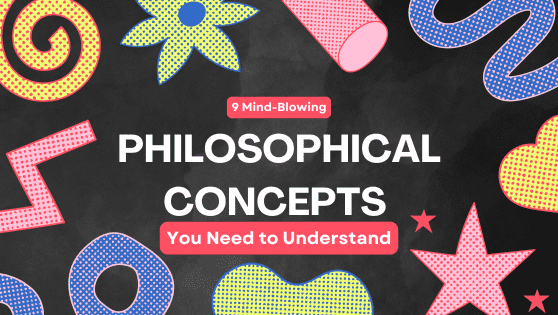Explore deep philosophical concepts that challenge your thinking.
Philosophical concepts, Philosophy has shaped human thought for centuries, providing profound insights into the nature of reality, existence, and knowledge. Understanding key philosophical concepts can enrich your worldview, spark deep contemplation, and challenge your perceptions. Here are nine mind-blowing philosophical concepts that you need to understand.

1. The Allegory of the Cave
Plato’s Allegory of the Cave is one of the most famous philosophical metaphors. It describes prisoners chained inside a cave, facing a blank wall, only able to see shadows cast by objects behind them. This allegory explores the difference between the perceived reality (shadows) and the true reality (objects casting shadows).
Why It’s Mind-Blowing:
- – Challenges our understanding of reality and perception.
- – Suggests that our sensory experiences are mere reflections of a deeper truth.
- – Encourages us to seek knowledge beyond our immediate experiences.
2. Cogito, Ergo Sum
René Descartes’ famous statement, “Cogito, ergo sum” (I think, therefore I am), asserts that the act of thinking is proof of one’s existence. This concept forms the foundation of Cartesian philosophy and emphasizes the importance of doubt and questioning.
Why It’s Mind-Blowing:
- – Establishes the self as the fundamental point of certainty.
- – Highlights the power of doubt in the pursuit of knowledge.
- – Encourages introspection and self-awareness.
3. The Trolley Problem
The Trolley Problem is a moral dilemma that explores the complexities of ethical decision-making. Imagine a runaway trolley headed towards five people tied to the tracks. You can pull a lever to switch the trolley to another track, where it will kill one person instead.
Why It’s Mind-Blowing:
- – Illustrates the conflict between utilitarianism (maximizing overall good) and deontological ethics (following moral rules).
- – Forces us to confront the difficult choices and consequences of our actions.
- – Sparks debates about morality, responsibility, and human values.
4. The Ship of Theseus
The Ship of Theseus is a thought experiment that raises questions about identity and change. If every part of a ship is replaced over time, is it still the same ship? This concept challenges our understanding of objects, identity, and continuity.
Why It’s Mind-Blowing:
- – Examines the nature of identity and what it means for something to remain the same over time.
- – Applies to broader contexts, such as personal identity and the nature of self.
- – Encourages contemplation of change and persistence.
5. Simulacra and Simulation
Jean Baudrillard’s theory of simulacra and simulation explores the relationship between reality, symbols, and society. Baudrillard argues that modern society has replaced reality with simulations, where symbols and signs represent things that no longer have an original.
Why It’s Mind-Blowing:
- – Challenges our perception of reality in a media-saturated world.
- – Suggests that we live in a hyperreal environment, where the distinction between reality and simulation blurs.
- – Provokes thought about the impact of media and technology on our understanding of the world.
6. The Unconscious Mind
Sigmund Freud’s concept of the unconscious mind revolutionized our understanding of human behavior. According to Freud, much of our thoughts, feelings, and desires are influenced by unconscious processes that we are not aware of.
Why It’s Mind-Blowing:
- – Highlights the complexity of the human mind and behavior.
- – Suggests that our actions and decisions are not entirely within our conscious control.
- – Encourages exploration of hidden motivations and desires.
7. Existentialism and the Absurd
Existentialism, particularly the works of Jean-Paul Sartre and Albert Camus, explores the meaning of existence in a seemingly indifferent universe. The concept of the Absurd highlights the conflict between humans’ search for meaning and the universe’s apparent meaninglessness.
Why It’s Mind-Blowing:
- – Confronts the existential questions about life, purpose, and meaning.
- – Encourages individuals to create their own meaning and values.
- – Emphasizes the freedom and responsibility of individual choice.
8. The Theory of Forms led to philosophical concepts
Plato’s Theory of Forms posits that the material world is a shadow of a higher, unchanging reality. According to this theory, the forms (or ideas) are the true essence of things, and what we perceive through our senses are mere imitations.
Why It’s Mind-Blowing:
- – Suggests that the true essence of things lies beyond our sensory experiences.
- – Challenges the notion of physical reality as the ultimate truth.
- – Encourages the pursuit of intellectual and philosophical understanding.
9. The Veil of Ignorance for philosophical concepts
John Rawls’ concept of the Veil of Ignorance is a thought experiment designed to promote fairness and justice. It asks individuals to design a society’s principles of justice from an original position where they have no knowledge of their own social status, abilities, or preferences.
Why It’s Mind-Blowing:
- – Encourages impartiality and fairness in ethical decision-making.
- – Highlights the importance of considering multiple perspectives in the pursuit of justice.
- – Promotes the idea of equality and social justice.
Conclusion about philosophical concepts
These nine philosophical concepts offer profound insights into reality, identity, ethics, and human behavior. Understanding and contemplating these ideas can enrich your perspective, challenge your assumptions, and inspire deeper thinking. Embrace these mind-blowing concepts and let them transform your understanding of the world.